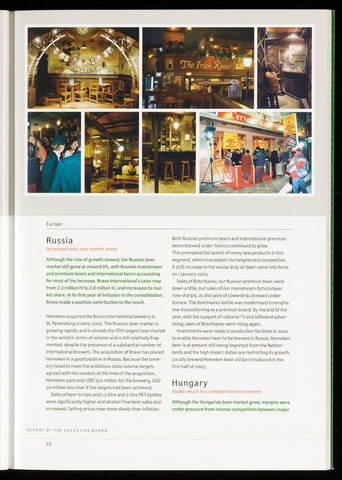Russia
Hungary
Increased sales and market share
Although the rate of growth slowed, the Russian beer
market still grew at around 8%, with Russian mainstream
and premium beers and international beers accounting
for most of the increase. Bravo International's sales rose
from 2.3 million hi to 2.8 million hi, and increased its mar
ket share. In its first year of inclusion in the consolidation,
Bravo made a positive contribution to the result.
Heineken acquired the Bravo International brewery in
St. Petersburg in early 2002. The Russian beer market is
growing rapidly and is already the fifth largest beer market
in the world in terms of volume and is still relatively frag
mented, despite the presence of a substantial number of
international brewers. The acquisition of Bravo has placed
Heineken in a good position in Russia. Because the brew
ery failed to meet the ambitious 2002 volume targets
agreed with the vendors at the time of the acquisition,
Heineken paid only USD 350 million for the brewery, USD
50 million less than if the targets had been achieved.
Sales of beer in cans and 1.5-litre and 2-litre PET bottles
were significantly higher and alcohol-free beer sales also
increased. Selling prices rose more slowly than inflation.
Both Russian premium beers and international premium
beers brewed under licence continued to grow.
This prompted the launch of many new products in this
segment, which translated into heightened competition.
A 25% increase in the excise duty on beer came into force
on 1 January 2003.
Sales of Botchkarev, our Russian premium beer, were
down a little, but sales of our mainstream Ochota beer
rose sharply, as did sales of Löwenbrau brewed under
licence. The Botchkarev bottle was modernised to empha
sise its positioning as a premium brand. By the end of the
year, with the support of national TV and billboard adver
tising, sales of Botchkarev were rising again.
Investments were made in production facilities in 2002
to enable Heineken beer to be brewed in Russia. Heineken
beer is at present still being imported from the Nether
lands and the high import duties are restricting its growth.
Locally brewed Heineken beer will be introduced in the
first half of 2003.
Stable result in a competitive environment
Although the Hungarian beer market grew, margins were
under pressure from intense competition between major
Europe
25

